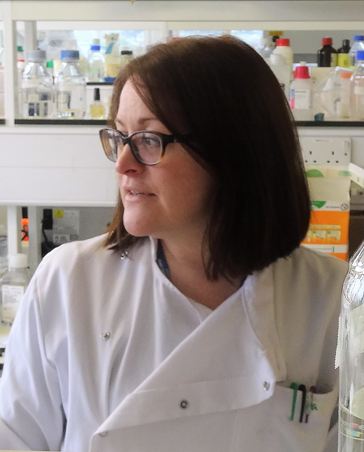Dr Philippa May, Clinical Scientist in Genetics
Healthcare is being transformed by our understanding of genetics and consultant clinical scientists are at the forefront of targeted therapies that are vastly improving outcomes for patients. We catch up with trainee consultant Dr Philippa May, Head of Education and Development for Healthcare Science at the Royal Free Hospital, about precision-medicine – and the need for scientists to be compassionate as well as inquisitive.

What made you choose this specialty?
I did an undergraduate degree in genetics and then started with a technical position. I fell in love with diagnostics straight away and so applied for the Scientist Training Program as soon as I could.
I trained initially as a cytogeneticist, which means I did a type of testing called karyotyping. DNA is compacted into 23 pairs of chromosomes which have an identical pattern in everyone. I examined a patient’s chromosomes to detect imbalance – literally looking at someone’s genome.
My job has always felt like a privilege as I could see something not even the patient themselves could see.
What thing are you most proud of in your career so far?
I have benefited from the support and encouragement of some wonderful colleagues in clinical genetics and I am a big believer in the principle of ‘paying it forward’. I am always keen to help others with career development and I am proud when someone specifically seeks me out to ask advice on routes to registration, development opportunities available to them, ways to apply for funding, qualifications or attendance to conferences and so on. It makes me proud when I give someone some advice, write a good reference for them, and see them go on to achieve something in their specialism.
What do you enjoy most about your job?
Diagnosing leukaemia is inherently bad news. However, advances in treatments for leukaemia means that I can identify a specific abnormality which will entitle the patient to a targeted therapy. They can go home and take one tablet a day with relatively few side effects and still go into remission.
Compared to standard chemotherapy, and all the awful side effects associated with it, this is ‘precision medicine’ and it is revolutionary for the patient. It is one of the most satisfying aspects of my job and the number of targeted therapies increases all the time.
And what are the most challenging aspects?
For quite a lot of our referrals – especially prenatal samples and cancer samples – there is considerable urgency to get the results out quickly. This can feel quite pressured at times but it does foster a supportive atmosphere, where staff need to work well as a team and be flexible when there are peaks and troughs of work.
Tell us something surprising or unusual about genetics…
Women have two X chromosomes [46,XX] and men have an X and a Y [46,XY]. The Y chromosome contains genes essential for male development, such as one called SRY.
However, the Y chromosome is only really essential early in development and is frequently lost from cells as men age. Men of a certain age are often troubled when I tell them that they may have quite a lot of 45,X cells!
What do you think are the key skills someone in genetics needs – and how do these skills help them do the job?
I am biased, but I think genetics is increasingly important throughout medicine – even in the disciplines where we are not dealing with inheritance of a disease and it might not seem relevant. Are some people more susceptible to influenza? Are some people more likely to be in an accident? So I think an inquisitive, forward-thinking mind is important.
I also think compassion is essential; we don’t see the patients themselves so it can be easy to forget that each sample is from a patient, and that the patient is likely to be extremely anxious about the result. A genetic test can be life-changing and it is important we remind ourselves of this.
What advice would you give students entering your field?
Take any opportunities to get experience of your chosen speciality before applying. Most laboratories will offer outreach activities of some description to students from local schools, or have open days for hopeful trainee scientists.
